In what appears to be Beijing’s tightening grip over Hong Kong, it’s only autonomous territory that practices democracy, pro-independence political party – Hong Kong National Party – has been banned. A notice from Hong Kong’s security minister says – “I hereby order that the operation or continued operation of the Hong Kong National Party in Hong Kong to be prohibited.”
It is the first time since Hong Kong was handed back to China by Britain 21 years ago that a political party has been banned, causing outcry among critics and pro-democracy activists. Under the terms of the 1997 handover, semi-autonomous Hong Kong is supposed to enjoy freedoms unseen on the mainland – including freedom of expression, association, and elections.
The unprecedented move of banning the pro-independence party on the grounds of national security has set tongues wagging about restrictions on political freedoms under Chinese President Xi Jinping. Essentially, it is now illegal to be a member of Hong Kong National Party, act on its behalf, or raise funds for it. Offenders could face up to three years in prison and fines of up to US$12,000 (HK$20,000).
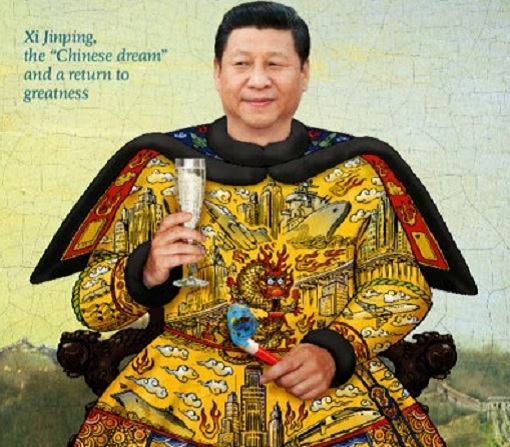
The decision is believed to be a follow-up from a recommendation by the Hong Kong police in July to outlaw the party under the colonial-era “Societies Ordinance” for posing an “imminent threat to national security” – despite the authorities admitting the party had not used any violence. Critics say the ban sets a worrying precedent for how the Societies Ordinance will be invoked (or rather abused) in future.
Maya Wang, senior China researcher for Human Rights Watch, said – “The banning of the Hong Kong National Party is a milestone in the Beijing and Hong Kong governments’ assault on Hong Kong’s freedoms. The ban violates a range of human rights guaranteed to Hong Kong people, including the rights to freedom of association and assembly.”
Founded in 2016 to promote Hong Kong’s independence from China, the Hong Kong National Party has already faced restrictions on operating prior to the ban. Its leader Andy Chan was one of several separatist candidates barred from standing in 2016’s legislative elections. The party has also struggled in the past to get police permission to hold rallies or protests.
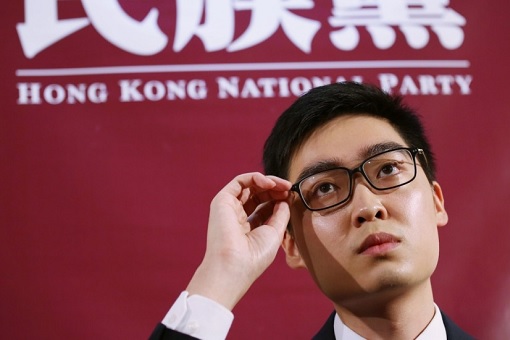
Coincidently, the banning of party comes the day after the opening of a controversial high-speed rail link (HSR) with China, which critics say was another blow to Hong Kong’s autonomy. That’s because Chinese law will effectively govern a part of West Kowloon Station, which is located in central Hong Kong, and Chinese police will be able to make arrests.
Clearly, Beijing is munching away the democracy being enjoyed by Hong Kong. The party and other democracy groups have actually lost momentum over the past two years as the government actively muzzles pro-independence sentiment. However, the sudden ban on Hong Kong National Party could be a mistake that may help the “small party” gain new waves of support.
Interestingly, after the stunning victory of 93-year-old Mahathir Mohamad in Malaysia’s May 9th polls, pro-democracy Hong Kong political parties have been using it as a case study to defeat Beijing. They have been rallying people and different parties to form a united front, the same way Mahathir’s Pakatan Harapan brought down ruling government Barisan Nasional’s 61-year in power.
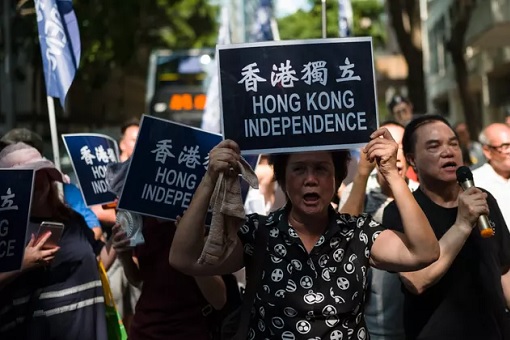
Activists calling for Hong Kong’s independence from China emerged after mass pro-democracy rallies in 2014 failed to win reforms. But campaigners have either been blocked from standing for office or disqualified from the legislature or jailed. Edward Leung, a leading independence activist, was jailed for six years in June on rioting charges after clashes with police in 2016.
The last straw that broke the camel’s back was perhaps Andy Chan’s speech at the Foreign Correspondents’ Club in August, where the leader of Hong Kong National Party described Beijing as Hong Kong’s “colonial master” and said – “If Hong Kong were to become truly democratic, Hong Kong sovereignty must rest with the people of Hong Kong. And there’s only one way to achieve this – independence.”
Britain’s Foreign Office has since expressed its concern at the ban, saying – “The UK does not support Hong Kong independence, but Hong Kong’s high degree of autonomy and its rights and freedoms are central to its way of life, and it is important they are fully respected.” A U.S. consulate spokesman said the ban was inconsistent with freedom of expression and association.
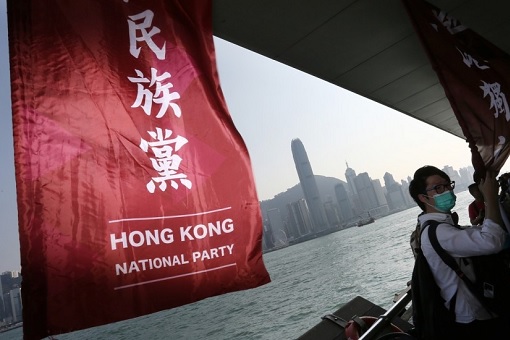
The European Union, on the other hand, said the ban “limits freedom of expression and association, as well as political activity in Hong Kong, and risks having a wider negative impact”. The Office of the Commissioner of China’s Foreign Affairs Ministry in Hong Kong, however, has issued a stern warning to representatives from other countries to respect the government’s law and policy.
Accusing the Hong Kong National Party as nothing but a separatist party disguised under the pretext of freedom of speech and association, China tells foreign countries to “fulfil their promise of supporting the unique ‘one country, two systems’” instead. It also told others to respect China’s sovereignty and territorial integrity.
Although some pro-Beijing analysts said the ban was targeted at the party and no one else, not many were convinced. For example, Tam Yiu-chung, Hong Kong’s sole representative to China’s top legislature, did not directly address questions on whether the ban would pave the way for further tightening of controls on other political groups.
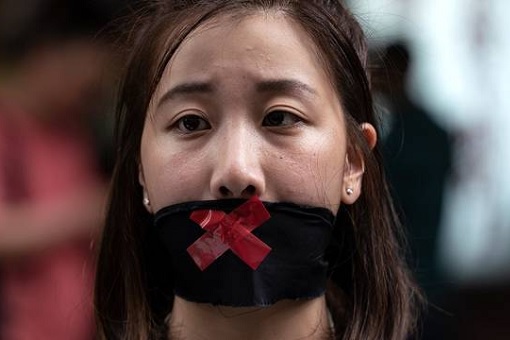
Nevertheless, Mr. Tam warned any advocacy for Hong Kong’s separation from China would lead to a dead end. The outlaw of the party could be Beijing’s first baby step – an experiment to test water – towards a total ban of political parties in Hong Kong eventually. The ban obviously was triggered to create the fear factor so that the public could become more cautious of stepping on legal landmines.
Other Articles That May Interest You …
- China OBOR In Jeopardy – After Malaysia, Maldives Corrupt President Suffers Unexpected Defeat
- The Mahathir Effect – The 80 Minutes Meeting That Has Gotten Singapore Terribly Upset
- Revealed!! – Britain’s Evil Plan In Denying Hong Kong People Nationality Before 1997 Handover
- FB Angry Emoji – CY Leung Gets 170K, Najib Razak Most Hated In ASEAN
- China vs Hong Kong Rivalry – These 22 “Naughty” Graphics Tell All
- Political Rivalries In Beijing Try To Recreate 1989 Tiananmen, In Hong Kong
- Here’s How Hong Kong Chief, CY Leung, Uses Gangster & Police To Break Protesters

|
|
September 25th, 2018 by financetwitter
|


|

|

|

|

|

|






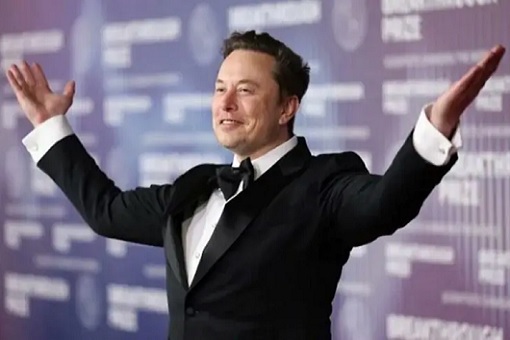





















Comments
Add your comment now.
Leave a Reply